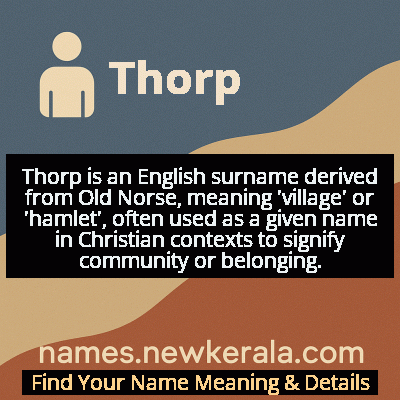Thorp Name Meaning & Details
Origin, Popularity, Numerology Analysis & Name Meaning of Thorp
Discover the origin, meaning, and cultural significance of the name THORP. Delve into its historical roots and explore the lasting impact it has had on communities and traditions.
Name
Thorp
Gender
Male
Origin
Christian
Lucky Number
5
Meaning of the Name - Thorp
Thorp is an English surname derived from Old Norse, meaning 'village' or 'hamlet', often used as a given name in Christian contexts to signify community or belonging.
Thorp - Complete Numerology Analysis
Your Numerology Number
Based on Pythagorean Numerology System
Ruling Planet
Mercury
Positive Nature
Adventurous, dynamic, curious, and social.
Negative Traits
Restless, impatient, inconsistent, prone to indulgence.
Lucky Colours
Green, white.
Lucky Days
Wednesday.
Lucky Stones
Emerald.
Harmony Numbers
1, 3, 9.
Best Suited Professions
Sales, marketing, travel, entertainment.
What People Like About You
Versatility, charisma, adventurous spirit.
Famous People Named Thorp
Thorp Mountain
Geographical Feature
Prominent peak in Washington's Alpine Lakes Wilderness, popular hiking destination
Thorp Springs
Historical Site
Former community and educational center in Texas, home to Thorp Spring Christian College
John Thorp
Inventor
American inventor who developed the ring spinning frame for textile manufacturing
Name Variations & International Equivalents
Click on blue names to explore their detailed meanings. Gray names with will be available soon.
Cultural & Historical Significance
Throughout English history, Thorp evolved from a descriptive term to an established surname, often appearing in the Domesday Book and other medieval records. Many English villages still bear names ending in '-thorp' or '-thorpe', such as Scunthorpe or Cleethorpes, preserving this linguistic heritage. The name carries echoes of rural England's pastoral landscape and the close-knit communities that characterized medieval life. In modern times, while used as a given name, it maintains its connection to English heritage and the romanticized ideal of village life.
The cultural significance extends beyond England to Scandinavian countries where similar place-name elements appear, reflecting the shared Germanic linguistic heritage. This cross-cultural presence makes Thorp a name that speaks to broader Northern European traditions while remaining distinctly English in its contemporary usage. The preservation of such names in modern times represents a continuity with historical patterns of community and identity formation.
Extended Personality Analysis
Individuals named Thorp are often perceived as grounded, practical, and community-oriented, reflecting the name's origins meaning 'from the village.' They typically exhibit strong connections to family and tradition, valuing stability and meaningful relationships over transient pursuits. Thorps are often seen as reliable anchors in their social circles, the type of people who remember birthdays, organize gatherings, and maintain long-term friendships. Their practical nature makes them excellent problem-solvers who approach challenges with methodical, commonsense solutions.
Despite their traditional leanings, Thorps often possess quiet creativity and innovation, much like the villages from which the name derives—small communities that were nevertheless hubs of craftsmanship and local industry. They tend to be observant and thoughtful, preferring to listen before speaking, which makes them excellent mediators and trusted confidants. Their connection to 'place' often manifests as strong environmental awareness or interest in history and genealogy. While not typically flashy or attention-seeking, Thorps command respect through their consistency, integrity, and deep commitment to whatever they undertake.
These personality characteristics create individuals who are both stable and adaptable—able to maintain core values while navigating change. The village symbolism suggests someone who understands their role within larger systems and recognizes that individual success is intertwined with community wellbeing. This makes Thorps particularly effective in leadership roles that require balancing tradition with progress, and personal ambition with collective benefit.
Modern Usage & Popularity
In contemporary naming practices, Thorp remains relatively uncommon as a first name but has seen steady usage, particularly among families with English heritage or those seeking distinctive yet traditional names. It ranks outside the top 1000 names in most English-speaking countries, making it a unique choice that stands out without being overly eccentric. The name has gained some popularity among parents interested in surname-names or those drawn to its strong, single-syllable impact. Modern usage often positions Thorp as a sophisticated alternative to more common one-syllable names like Scott or Grant, appealing to parents who value both distinctiveness and historical resonance. Its usage has remained consistent rather than trending, suggesting it appeals to a specific demographic rather than following broader naming fashions. The name appears occasionally in professional contexts and creative fields, where its uniqueness can be an asset without being distracting. Contemporary Thorps often appreciate their name's conversation-starting quality and the connection it provides to English linguistic history.
Symbolic & Spiritual Meanings
Symbolically, Thorp represents connection to community, roots, and the enduring value of simple, grounded living. It evokes images of the village green, communal gatherings, and the interwoven lives of small communities—symbolizing that strength comes from connection rather than isolation. The name carries metaphorical weight as representing the foundation upon which larger structures (cities, civilizations) are built, reminding us that greatness often has humble beginnings. In a modern context, it symbolizes a return to authenticity and a rejection of urban anonymity, representing the human need for belonging and shared identity.
The village imagery suggests harmony with nature, seasonal rhythms, and the idea that true wealth lies in relationships and community rather than material possessions. Symbolically, Thorp also represents resilience and continuity—villages endure through generations, adapting to change while maintaining essential character. This makes the name particularly meaningful in times of rapid social transformation, serving as an anchor to traditional values of mutual support and shared responsibility. The name's etymological connection to physical place also symbolizes the importance of having a 'center' or home base from which to engage with the wider world.

